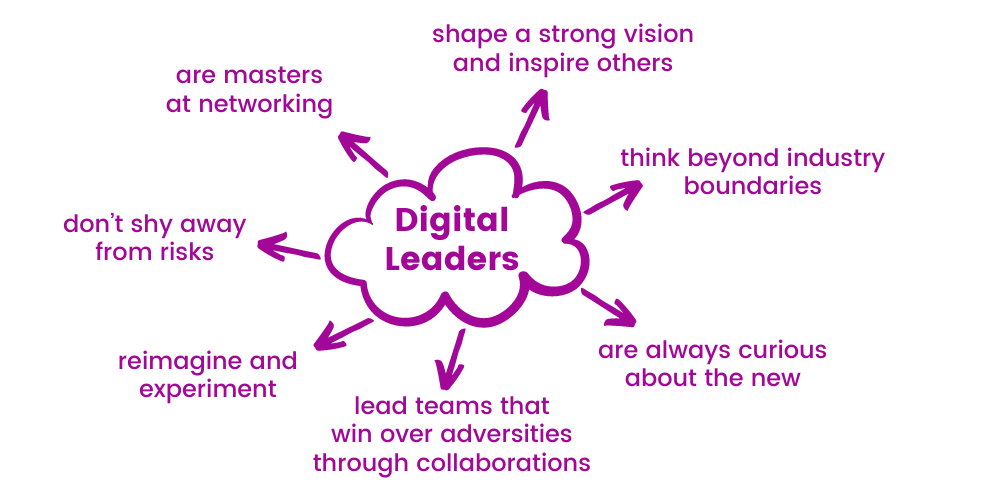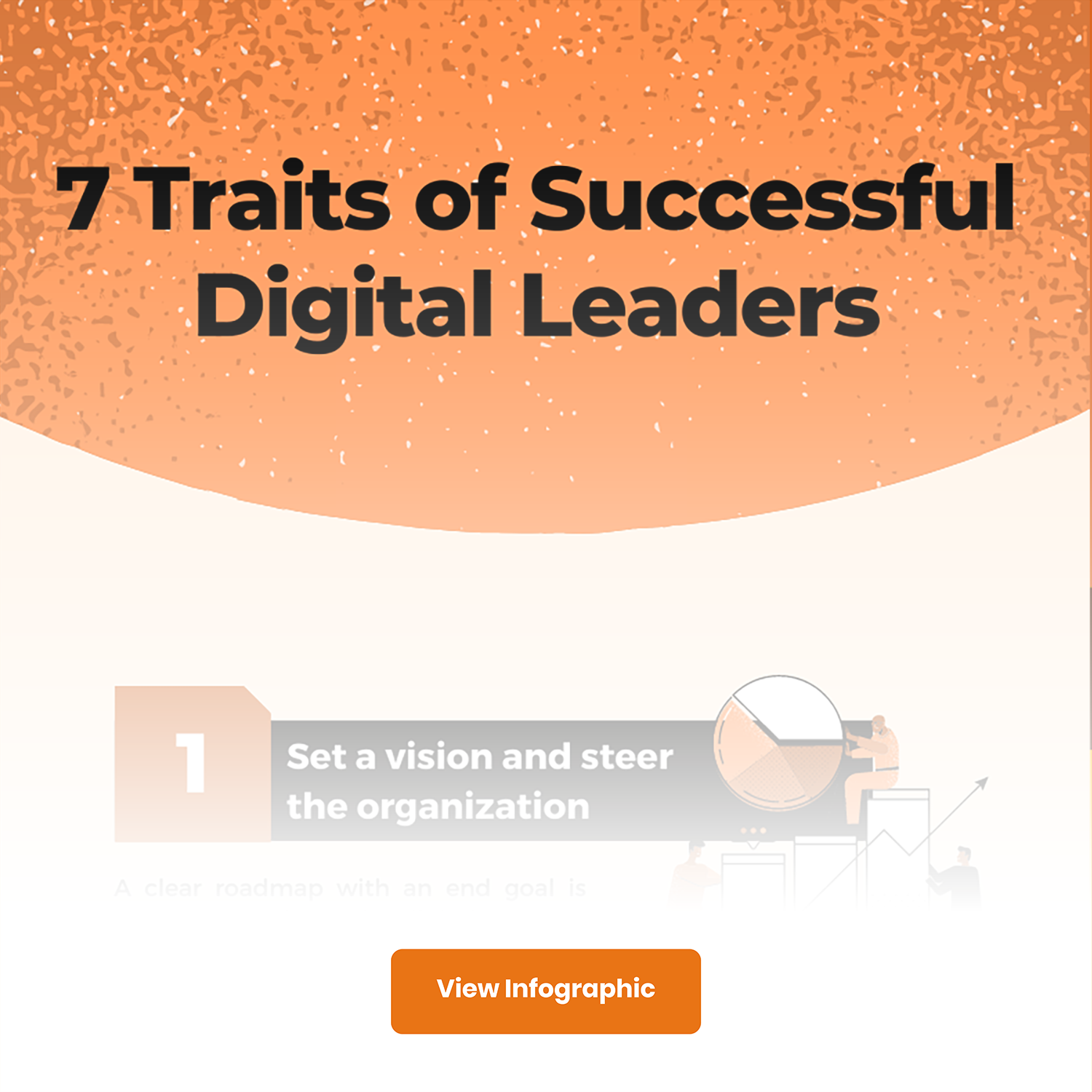
This article highlights key traits of digital leaders that allow them to leverage disruptions and scale their organization through digital transformation.
As a pandemic-led uncertainty is sweeping through organizations and functions, we can only be sure that we are stepping into a digital future. From hybrid workplaces to online collaboration, the onset of a digital future has never been more evident. According to The Economist, digital-enabled services are soon going to be regular features in every sphere. Major advancements in technology and adoption have created a space where being a laggard is simply not an option for any business. However, to adopt these practices and integrate them into the core functions of any organization, the presence of digital-ready leadership is an absolute prerequisite.
Also read: Digital Workplace – All You Need to Know
Who is a Digital Leader?
Digital-ready leaders lay the foundation of digital transformation and streamline organizations in a way that allows them to reap maximum benefits from disruptions. They support and inspire employees to change the way they work; they revolutionize their processes, increase profitability, and lead their organizations to phenomenal success.
Let’s take a look at a few traits that all digital-ready leaders possess.

1. Digital leaders shape a strong vision and inspire others
Nothing starts without a concrete roadmap having clear milestones and actionable checklists. Digital leaders are able to create a vision that acts as a compass for others to follow. This vision can stem only from sound digital literacy, sufficient technical knowledge, and a thorough investigation into the company’s strengths and weaknesses.
They drive digital transformation by introducing initiatives and platforms, engaging others to maximize adoption, and governing the actual results against expected results. This is not to say that they are rigid or inflexible, as no technological advancement is possible without creativity and innovation (more on that later). What this means is that they don’t take a backseat just because they took a few digital initiatives and think that will be enough. They actively monitor and inculcate these practices to reach and exceed business expectations.
Also read: Digital Leadership in a New Era and How Workplace Culture Matters More Than Ever
2. They think beyond industry boundaries
We talked about creativity and innovation above. Transformations and revolutions don’t take place under the confines of existing industry practices and benchmarks. And those who did not wait for a pandemic to bring about a technological revolution in their company are reaping maximum benefits among a startling number of laggards. It’s not enough to follow the best practices and emulate what’s already been done. True leaders don’t settle for the present; they gear up for the future.
Leaders constantly identify gaps in their industries and then set out to bridge them through the latest technological innovations. They don’t go by the book; instead, they become a pioneer for others to follow.
Here’s a short, easy to grasp infographic version of traits of a digital leader.

3. They are always curious about the new
Creativity is inadvertently followed by curiosity, as digital leaders set out to find new and tech-savvy ways to implement their digital vision. Digital transformation has to come top-down, and such leaders are always on the lookout for the next disruptor. Curiosity runs in their veins, and they are automatically one step ahead of everyone as they predict shifts and trends in the industry. Successful digital leaders also don’t shy away from getting their hands dirty trying out new technologies and tools themselves. In fact, they are the first ones to jump in and give them a try.
For example, curious digital leaders discovered and adopted pathbreaking practices like business automation and no-code development well before others, allowing their companies to stand out and reach heights that were seldom imagined before.
Also read: Breaking down the basics of Digital Dexterity: What it means for you!
4. They lead teams that win over adversities through collaborations
While digital know-how and technical knowledge aid leaders, it is their soft skills that are of the utmost importance when they lead their teams through periods of transition and disruption. According to Harvard Business Review, true digital transformation can only come about if leaders take the initiative to inspire their teams to upskill and provide them with the required support.
They also need to coach their teams in the face of adversities that are inevitable when undertaking such adoptions and changes. From contingency plans to hand-holding when necessary, digital leaders are very sensitive to the needs of their teams and strategize accordingly. They also create a culture of collaboration, through communication and platforms that allow team members to reach out to each other and work towards the greater organizational goal.
A team-centric and knowledge-sharing culture is a bigger priority for digital leaders than conventional hierarchies. This allows their teams to power through periods of unexpected change and adversities without losing sight of the bigger picture.
Also read: 10 Key Digital Leadership Practices to Follow
5. They reimagine and experiment
We have mentioned roadmaps and checklists above, but we know that the journey to digital transformation is not that linear and simple. It takes a lot of experimentation and trial to pin down what works and what does not. This is where the vision and perseverance of digital leaders come into play, as they don’t back down after a few failed experiments. They create an environment and work culture where the teams feel empowered to innovate and experiment without the fear of failing. Successful digital leaders imagine a future that is nothing like the status quo, and then they experiment to the point of implementing that future into a reality.
Also Read: Digital Transformation: Objectives, Contributing factors & the Road map ahead
6. They don’t shy away from risks
Needless to say, undertaking the process of digital transformation is a step away from the comfort zone of many companies. However, digital leaders have a good risk-taking appetite and can see the results that the future will reap instead of getting carried away by temporary setbacks and challenges.
Digital leaders do not fear failures as long as they learn from them and use the lesson to make better decisions going ahead. These risks ultimately pay off and allow their organizations to scale like never before.
Also Read: The Must-Know Digital Leadership Styles
7. Digital leaders are masters at networking
Great minds think alike, and they often inspire each other. Digital leaders derive inspiration from others by leaving no stone unturned when it comes to networking. The pandemic has also allowed for a host of webinars and summits to take place virtually, which digital leaders have been using to their benefit. They showcase their own vision and accomplishments while learning from others and make meaningful connections with other industry leaders that inadvertently help in the long run.
Conclusion
To sum it up, digital leaders stand out because of their innovation and vision, and not necessarily through their position or seniority. By fostering a culture of digital dexterity and adoption in their organization, such leaders take their organization a league ahead. They are well aware that every industry, from manufacturing to legal, can benefit from digital practices. They lead by example and make their organization proud.
Also listen: 7 Characteristics of Successful Digital Leaders
Now that you know what a successful digital leader possesses, why don’t we tell you about our platform which is loved and used by many digital leaders? Quixy allows you to build custom applications and platforms without a single line of code, automating your business and streamlining collaboration across your organization. Our platform has benefitted organizations throughout industries and has helped them bring about a promising technological revolution.
Get started with our platform, and experience the ease of automated processes and personalized app building.
The bridge between your company and digital transformation is just a click away.
Frequently Asked Questions(FAQs)
Q. Why is digital leadership crucial for successful digital transformation?
Digital leadership refers to the ability of leaders to drive and guide organizations through the process of digital transformation. It involves understanding technology trends, fostering a digital culture, and aligning digital initiatives with business objectives to achieve successful digital transformation. Effective digital leadership skills, such as strategic vision, adaptability, and strong communication, are crucial in navigating and leading successful digital transformations.
Q. What are the key skills & traits of effective digital leaders?
Effective digital leaders possess technical expertise, digital leadership skills, strategic vision, adaptability, strong communication skills, and the ability to inspire & empower their teams. These skills are essential for driving and managing digital transformation success by leveraging digital technologies, fostering innovation, and navigating the complex landscape of digital change.
Q. What are the key skills and traits of effective digital leaders?
Effective digital leaders possess a combination of technical expertise, strategic vision, adaptability, strong communication skills, and the ability to inspire and empower their teams. They embrace innovation, promote a growth mindset, and prioritize continuous learning to navigate the rapidly evolving digital landscape.
Q. Why digital transformations fail?
Digital transformations can fail due to various reasons, including resistance to change, inadequate planning, lack of clear objectives, poor communication, and insufficient employee engagement. Leaders can mitigate these risks by fostering a culture of agility, providing proper resources and training, ensuring effective change management, and creating a supportive environment for innovation.
Q. Who are digital marketing leaders?
Leaders in digital marketing are individuals or organizations that excel in leveraging digital channels, technologies, and data to drive successful marketing strategies. They deeply understand consumer behavior, employ data-driven decision-making, stay ahead of digital leadership trends, and continuously optimize their marketing efforts to achieve measurable results.
Q. How can business leaders embrace digital integration strategy?
Business leaders understand the need for a digital integration strategy by staying informed about industry trends, engaging in digital transformation conversations, attending relevant conferences and workshops, and seeking guidance from digital experts. They must recognize the potential benefits and competitive advantages that a well-executed digital integration strategy can bring to their organization.
Q. Who are the leaders in digital transformation?
Leaders in digital transformation are individuals or organizations that have successfully embraced and implemented digital technologies to drive organizational change and innovation. They have a clear digital vision, strong leadership skills, a focus on customer experience, a willingness to take calculated risks, and a commitment to continuous improvement.
Q. List examples of business digital leaders who are successful?
There are several notable examples of digital transformation leaders who have achieved successful digital transformations such as Satya Nadella at Microsoft and Mary Barra at General Motors. These leaders have demonstrated a strategic approach, embraced digital technologies, fostered innovation, and effectively navigated their organizations through transformative digital journeys.
Login
Please login to comment
0 Comments
Oldest
















